Topic: Curriculum
Haas welcomes hundreds of new undergrad, MBA, PhD students to campus
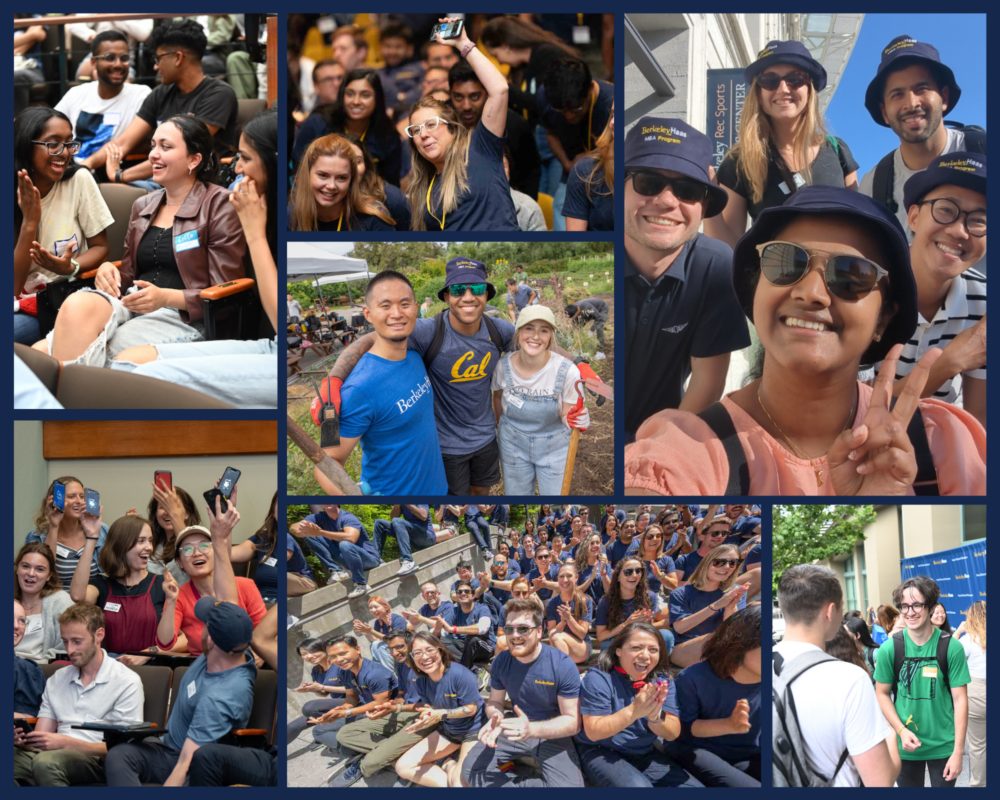 Berkeley Haas welcomed an accomplished group of nearly 700 new full-time MBA, undergraduate, and PhD students to campus, kicking off the start of the fall 2023 semester. (The new evening & weekend and executive MBA classes arrived on campus earlier this summer.)
Berkeley Haas welcomed an accomplished group of nearly 700 new full-time MBA, undergraduate, and PhD students to campus, kicking off the start of the fall 2023 semester. (The new evening & weekend and executive MBA classes arrived on campus earlier this summer.)
Full-time MBA program
A total of 244 new full-time MBA students kicked off five days of Week Zero orientation last Monday. Orientation included sessions on academic life at Haas, diversity, equity, inclusion, justice and belonging (DEIJB), team building, and career planning.
Wendy Guild, the new assistant dean of MBA programs at Haas, welcomed the class. “I want to celebrate the fact that you are here,” she said, noting that 2023 is a special year for Haas, marking the school’s 125th anniversary. “We have staying power,” she said. “We’re not going anywhere… We’re just getting better.”
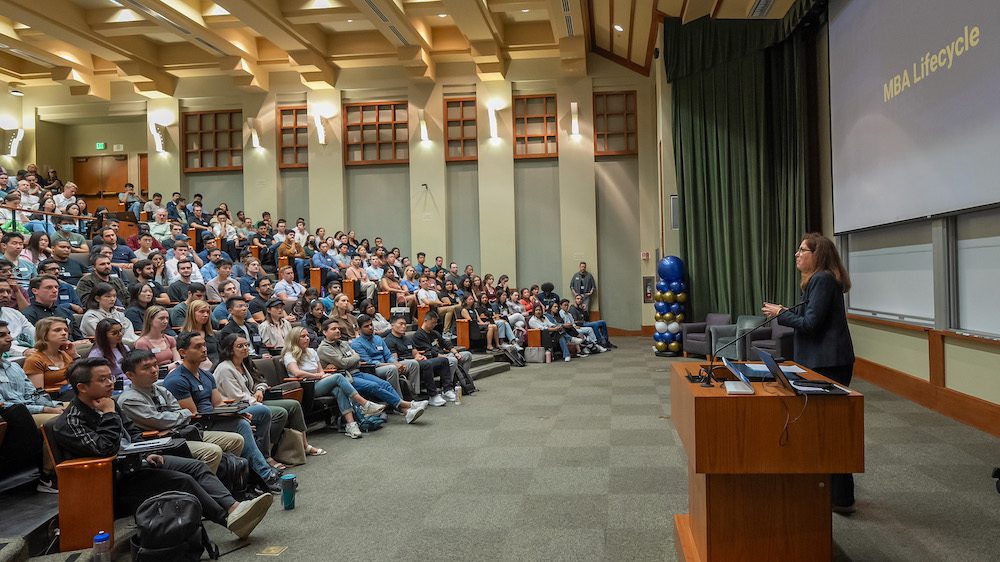
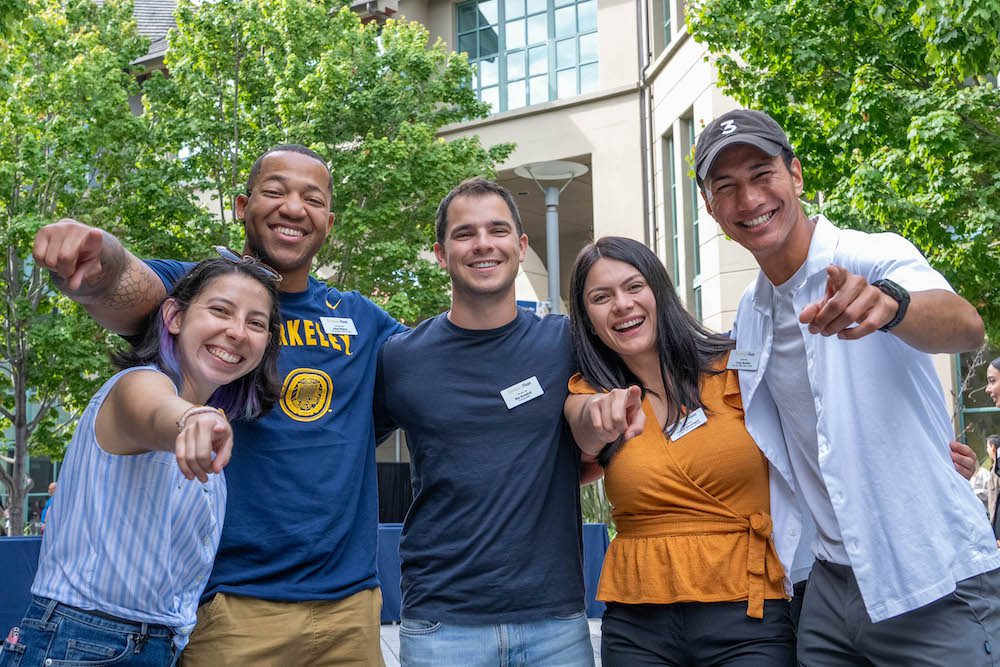
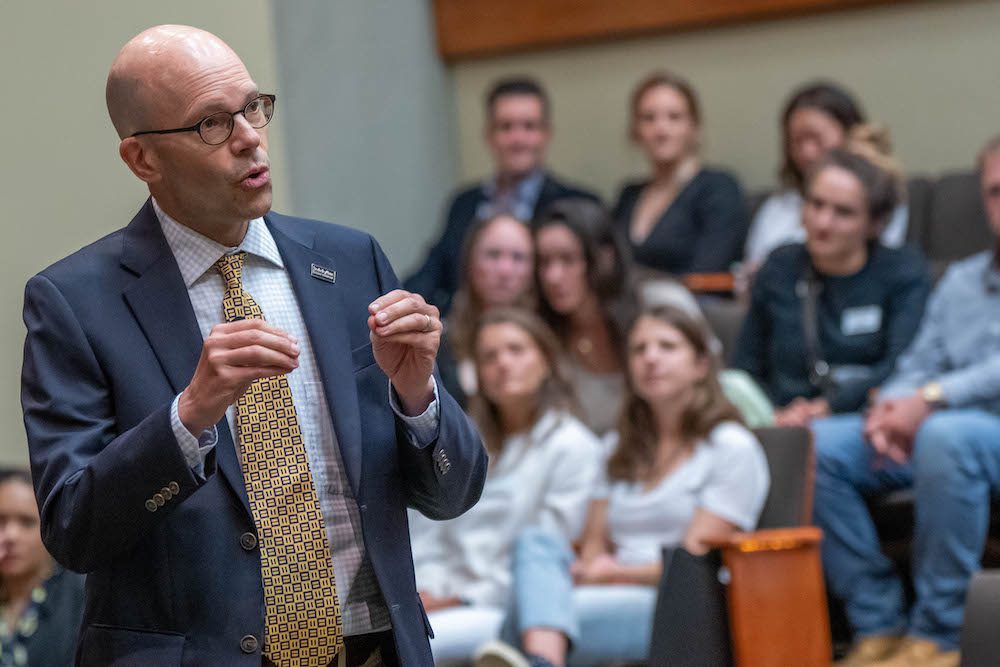
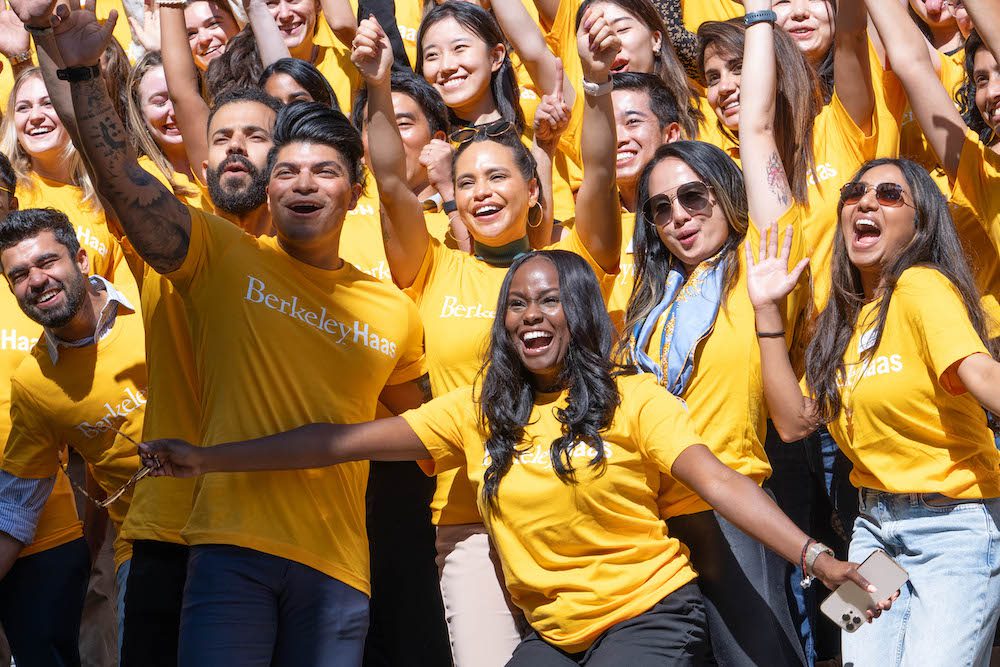
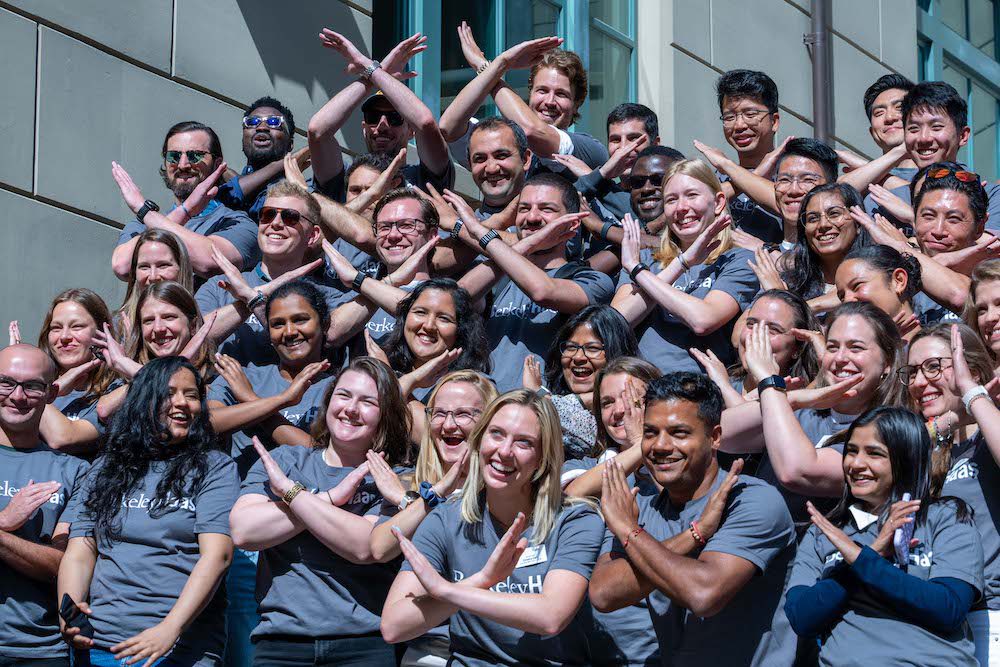
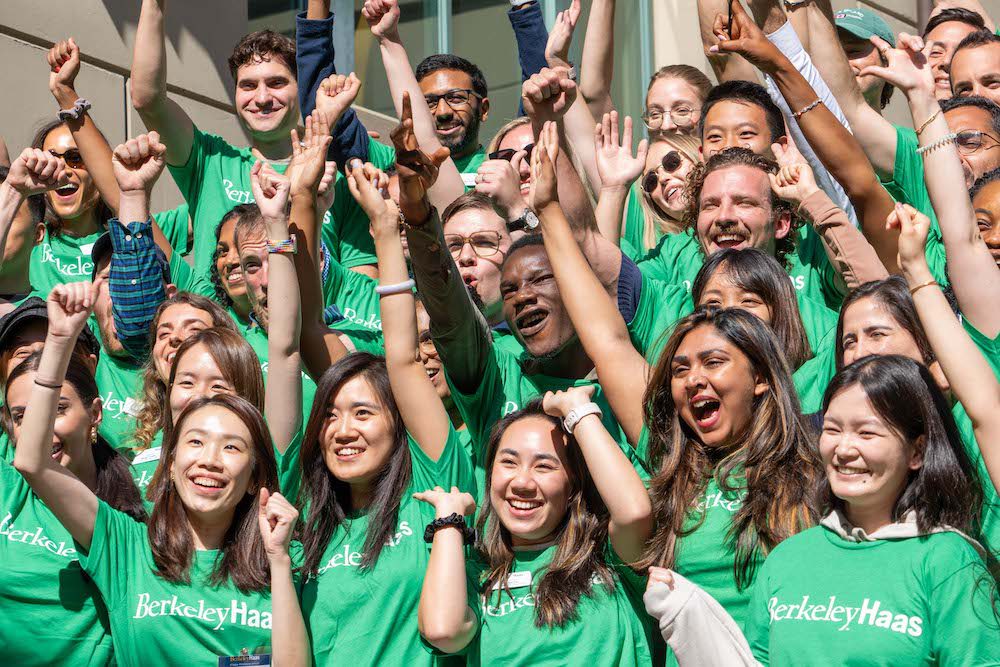
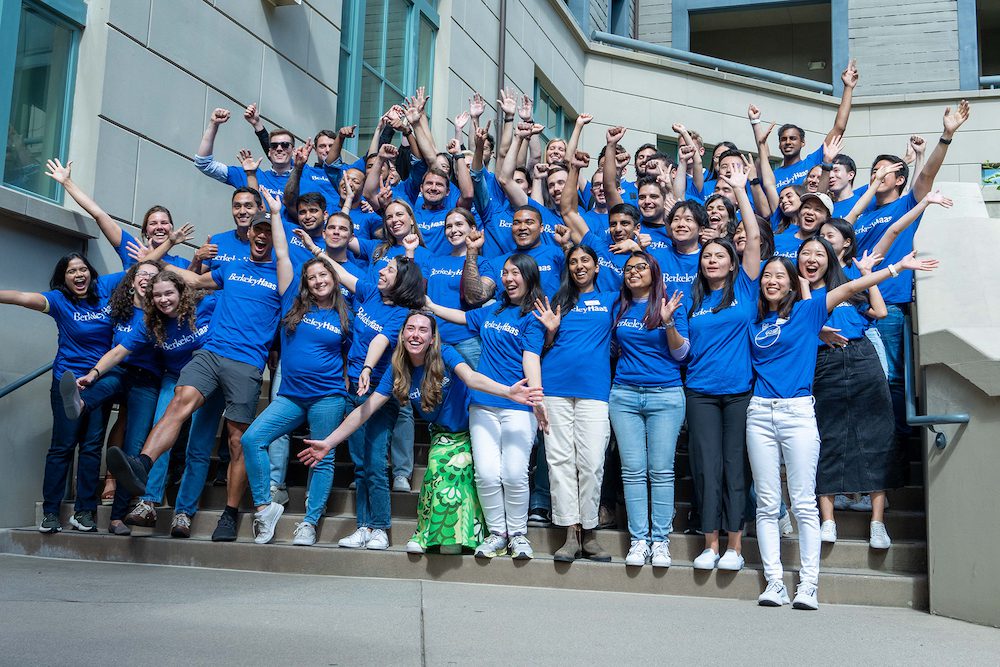
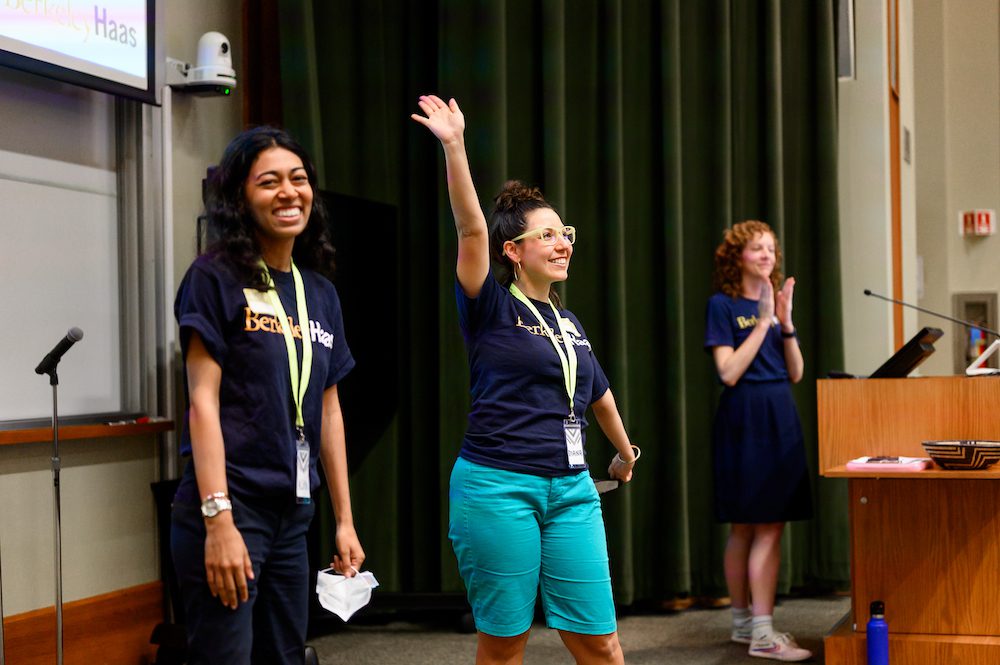
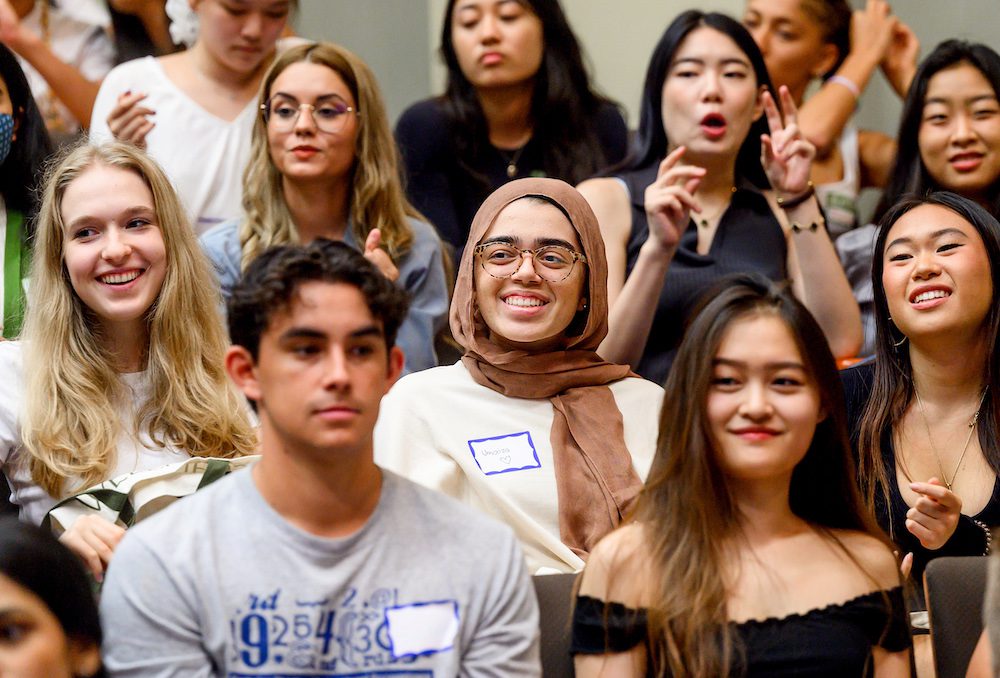
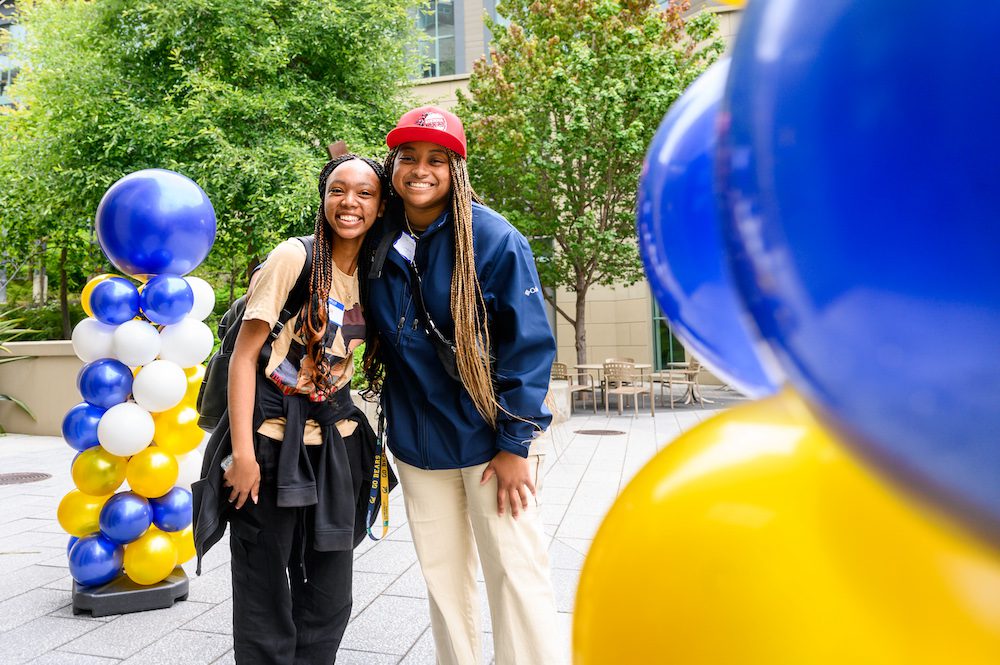

New students participated in a whirlwind of orientation activities—from a scavenger hunt to an ice cream social to cleanup work at a local nonprofit that supports people who are homeless.
The MBA students are an accomplished group, with an average of nearly six years of work experience, with 20% coming the tech sector and 24% from consulting.
Remy Freire, MBA 25, was a consultant at Bain & Company in Washington D.C. before coming to Haas.
“I’m interested in climate tech and renewable energy and I thought that the MBA would be a chance to take classes and do an internship in that area, and get some hands-on experience. A lot of folks are interested in this at Haas and I’ll be meeting people with similar interests to mine.”
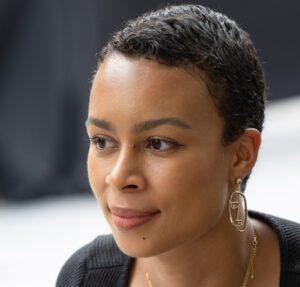
The class boasts 41% women and is richly international, including students from 39 countries.
Imogen O’Connor, MBA 26, worked as an analytical manager with the National Health Service (NHS) in the UK before she came to Haas.
“What really prompted me to do an MBA was around change management and leadership because I was coming up against a lot of barriers in the NHS,” she said. “I really care about health care and just helping people. I think I need to develop certain skills in order to do that properly.”
The class has an average collective GMAT score of 732, and GREs of 163 quant and 161 verbal, and an average GPA of 3.63.
Eric Askins, director of MBA admissions, told the students to expect to learn from peers who come from a variety of backgrounds and experiences. Notably, 20% of the students in this class are the first generation of college students in their families. Fourteen of the new students are pursuing a dual MPA/MPH (public health) degree; nine are enrolled in the MBA/MEng (engineering) program.
Orientation week alumni speaker Lo Toney, MBA 97, founding managing partner at Plexo Capital, shared his wisdom with the class, encouraging students to explore and take advantage of the breadth and depth of the UC Berkeley and Haas campus resources, focus on academics in the first quarter in particular, and reach out to alumni to build a network.
Undergraduate program
The entering undergraduate class is 421 students strong this year. The new class includes 103 transfer students and 240 continuing students, as well as new undergraduates students enrolled in special undergrad programs including The Global Management Program (GMP), The Robinson Life Science, Business, and Entrepreneurship Program (LSBE) (25 students), and the Management Entrepreneurship and Technology (M.E.T).
Acting Dean and Professor Don Moore, whose research covers leadership and confidence in business and beyond, welcomed the students.
“You’re joining a community of innovators, renowned researchers, entrepreneurs, and movers and shakers who have made a profound impacts on business and on society,” he said.
“You’re joining a community of innovators, renowned researchers, entrepreneurs, and movers and shakers who have made a profound impacts on business and on society.” – Acting Dean Don Moore
Moore said the long list of leaders who embody the Berkeley Haas Defining Leadership Principles (Question the Status Quo, Confidence Without Attitude, Students Always and Beyond Yourself) includes professional golfer Collin Morikawa, BS 19, who won the 2020 PGA Championship; Nabeela Syed, BS 21, the first Muslim Indian-American and the youngest woman to serve in the Illinois House of Representatives; and gaming entrepreneur Kevin Chou, BS 02, who with his wife, Dr. Connie Chen, provided the largest-ever personal gift to UC Berkeley by an alumni under the age of 40 to help fund Chou Hall.
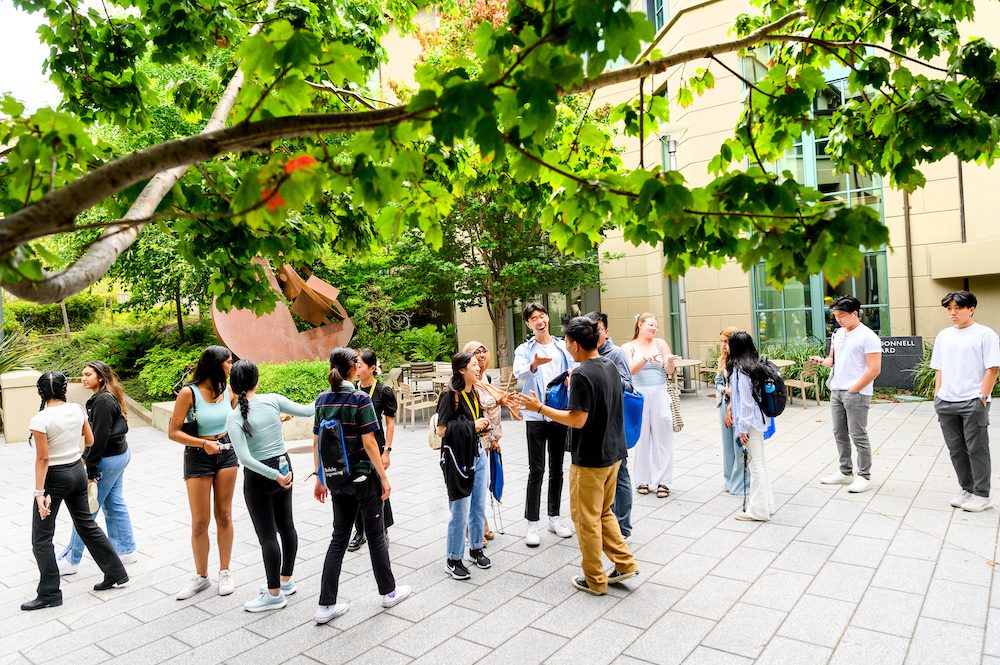
Emma Hayes Daftary, assistant dean of the undergraduate program, told the students that “the DLPs will challenge you to shift from what you, as an individual, can achieve, to what we, as a community, can accomplish.”
“We are living in a time of tremendous global transition, and within this time of upheaval and transition comes an urgent call for informed, collaborative, effective leaders,” she said. “There are urgent issues that are facing us—urgent issues that will require extraordinary leadership to develop and execute solutions to solve them.”
PhD program
The PhD program welcomed its largest-ever cohort of 19 new students from around the world—including Russia, China, Ethiopia, India, South Korea, Nigeria, Portugal, Canada, and Germany.
New students include Abdulmuttolib (Abdul) Salako, Ziyi Liu, Sean Chen, Sarah Danner, Hanna Yu, Sara Shemali, Jordan Mickens, Nikita (Nick) Akimov, Wenxiao Yang, Srikanth Janjirala, Yutao Chen, Maggie Ye, Skyler Chen, David Gravanita , William Zhang, Zi Yang Chen, Nathan Godin, Nick Otis, and Fikremariam (Fikre) Gedefaw.
View PhD student profiles here.
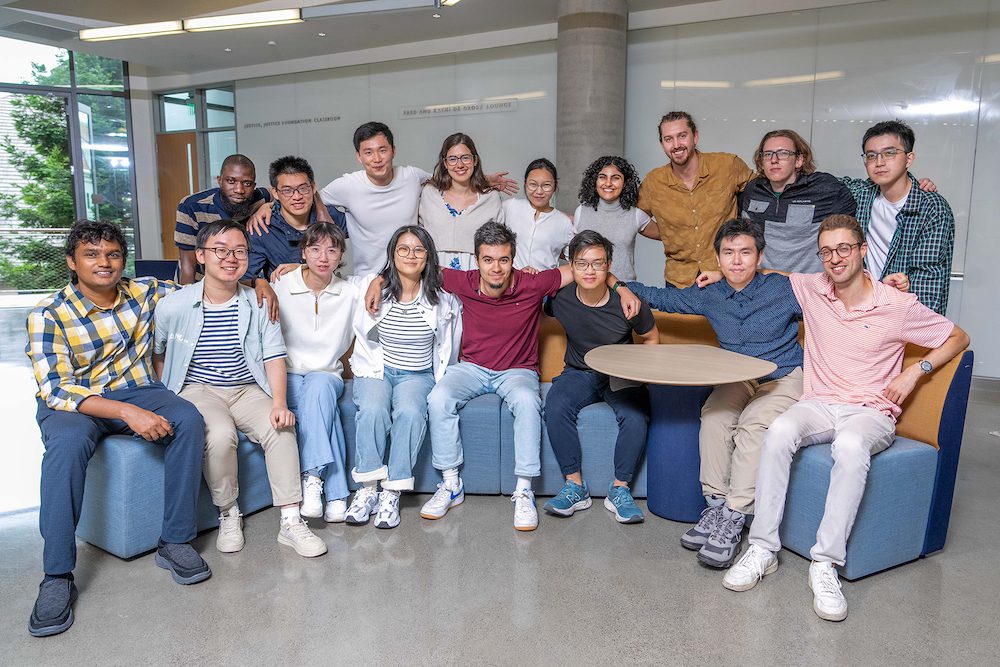
A Day in the Life of an MFE
Different paths lead to opportunity for Cal RBs Ashton Stredick and Isaiah Ifanse
A searcher on the trail of the perfect acquisition
GMAT versus GRE: Which Top 50 MBA programs prefer which test?
Why Berkeley Haas’ new Flex MBA program is so popular
How an MBA helps you get the position and salary you deserve
Berkeley Haas anniversary marks 125 years of reimagining business
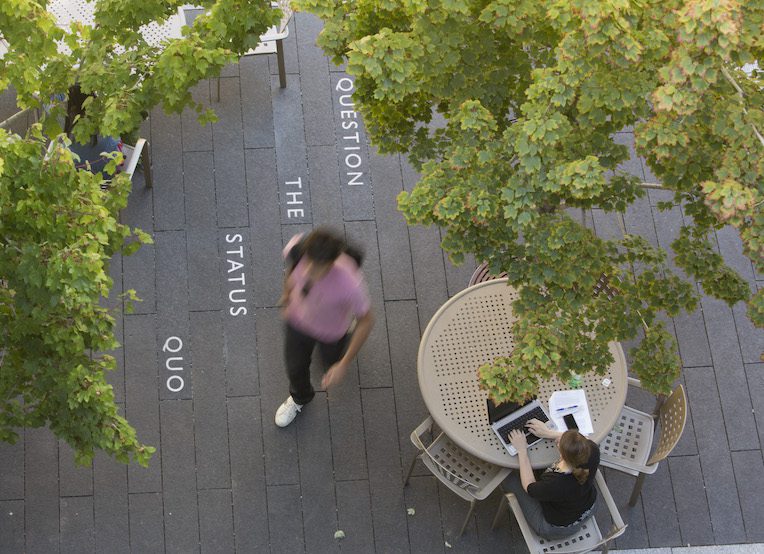
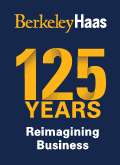 Berkeley Haas this month is kicking off its anniversary celebration of 125 years of reimagining business. The festivities commemorate a significant milestone in the school’s history as a leader in advancing management education, corporate responsibility, innovation, and entrepreneurship.
Berkeley Haas this month is kicking off its anniversary celebration of 125 years of reimagining business. The festivities commemorate a significant milestone in the school’s history as a leader in advancing management education, corporate responsibility, innovation, and entrepreneurship.
Founded in 1898 as the College of Commerce with just three students, Haas has expanded to nearly 3,000 students across six programs, all of which rank in the top 10 and boast a world-renowned global faculty. Haas has 44,000 living alumni worldwide, spanning more than 20,000 organizations in 81 countries.
“A 125th anniversary is a remarkable achievement for any business school, especially given the immense changes that business and business education have gone through,” said Berkeley Haas Dean Ann E. Harrison. “As the world’s number one mission-driven business school, we take pride in developing innovative business leaders who consider the long-term impact of their actions—and increasingly, that requires a lens for sustainability and inclusion.”
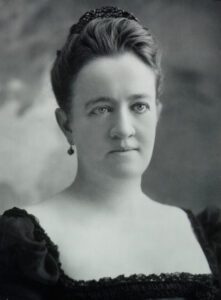
Haas has always been a pioneer. It is the first business school founded at a public university, and the second-oldest in the U.S. It is the only leading business school to be founded by a woman, Cora Jane Flood.
It’s also the first top business school to be led by two female deans, Professor Laura Tyson (1998–2001 and 2018), and Harrison (since 2019).
And from the start, the school has had a distinctive culture.
That culture was formally codified in 2010, when the school unveiled its Defining Leadership Principles (DLPs): Question the Status Quo, Confidence without Attitude, Students Always, and Beyond Yourself. Shepherded by then-Dean Rich Lyons and anchored by the organizational culture research of Professor Jennifer Chatman, the DLPs are a source of pride for the community—and a competitive advantage.
Senior Assistant Dean Courtney Chandler, Haas’s Chief Strategy and Operating Officer, described the principles as much more than mere aspirations or platitudes. They are, rather, aligned tightly with the school’s strategy. “Powerful leaders think about culture all the time,” Chandler said. “If done well, everything relates back to the culture, from how we set priorities to how we get buy-in from people to how we show up as a community.”
“Powerful leaders think about culture all the time. If done well, everything relates back to the culture, from how we set priorities to how we get buy-in from people to how we show up as a community.” — Senior Assistant Dean Courtney Chandler, BA 90, MBA 96.
Life-changing Research
The Haas legacy includes generations of researchers and teachers who have changed how industry leaders think and do business. That legacy includes two Nobel laureates. The late John Harsanyi won the Nobel Memorial Prize in Economic Sciences in 1994—along with John Nash from Princeton University and Reinhard Selten from Bonn, Germany—for advancing the study of game theory, and in particular, how parties act in negotiations with incomplete information.
The late Oliver Williamson became the school’s second Nobel laureate—along with Elinor Ostrom of Indiana University—in 2009 for bringing together economics, organization theory, and contract law to invent the field of transaction cost economics, fundamentally reshaping understanding of how firms operate in the marketplace.
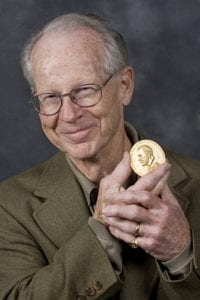
Many other Haas faculty members have ushered new ideas into the world, including Henry Chesbrough, PhD 97, who created the novel theory of Open Innovation; and David Aaker, the father of modern branding, who defined brand equity and the idea of the brand portfolio.
Professor David Teece established his groundbreaking theories of dynamic capabilities in 1997; and Ikujiro Nonaka, MBA 68, PhD 72, a knowledge management expert, envisioned knowledge as a living and breathing entity that must be shared among workers to reach its full potential.
Finance Professor Ulrike Malmendier, who researches how individual biases affect corporate decisions, stock prices, and markets, illuminated many ways in which human psychology and systematic biases influence economic behavior. For her work, Malmendier won the prestigious 2013 Fischer Black Prize.
Women at Haas have also made pioneering contributions as visionary leaders—since Mary Dickson became the first woman to get a degree from the school in 1906. Professor and former Dean Laura Tyson served on President Clinton’s cabinet, and was also the first woman to chair the Council of Economic Advisers and direct the National Economic Council.
Professor Emeritus Janet Yellen, who taught macroeconomics at Haas for 25 years, is now the first woman to serve as U.S. Secretary of the Treasury and was the first to chair the Federal Reserve.
Accelerating Innovation
Berkeley Haas has also been a hub of innovation and a launching ground for entrepreneurs over the years. In 2022, for the fourth straight year, UC Berkeley was named the nation’s best public university for startup founders, and the second-best university among both private and public schools, according to Pitchbook’s annual ranking.
In 2022, for the fourth straight year, UC Berkeley was named the nation’s best public university for startup founders
In 1970, six years before Apple Computer was founded, Dean Richard Holton taught one of the country’s first entrepreneurship classes at Haas with Leo Helzel, MBA 68. Lecturer Steve Blank took the teaching of entrepreneurship in a cutting-edge new direction in 2011 with his Lean LaunchPad method. Blank taught students to build a company by developing business models rather than traditional business plans, iterating models quickly based on customer feedback. This approach is now accepted practice for entrepreneurs.
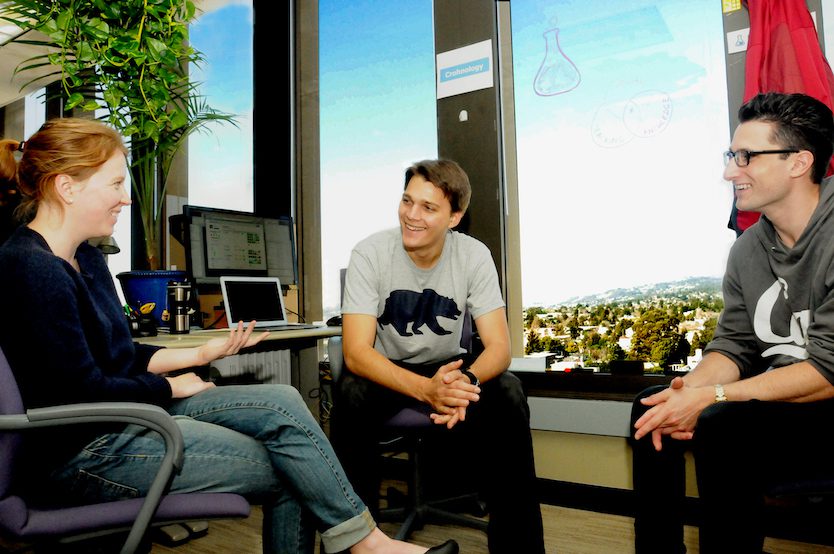
Haas students have been honing startup skills for years in programs like the UC Berkeley LAUNCH accelerator; SkyDeck, a partnership between the Haas School of Business founded in 2012 with the College of Engineering, and the Office of the Vice Chancellor for Research; and The Cleantech to Market accelerator program, which for 15 years has been pairing students with entrepreneurs to help bring promising climate tech innovations to market.
Visionary entrepreneurs
Over the years, Haas students and alumni have founded hundreds of companies as part of the UC Berkeley startup ecosystem. Among the school’s notable alumni entrepreneurs:
- John Hanke, MBA 96, CEO of Niantic Labs, was instrumental in creating Google Earth, Maps, and Street View, which brought sophisticated geospatial data visualization to the masses. Hanke then masterminded the wildly popular augmented reality Pokémon Go game.
- Paul Rice, MBA 96, founded Fair Trade USA, whose Fair Trade Certified seals signify products made according to fair trade standards.
- The late Priya Haji, MBA 03, co-founded Free at Last, a national program for substance abuse treatment and HIV/AIDS intervention; World of Good,a sustainable/fair trade product marketplace acquired by eBay in 2010, and served as CEO at SaveUp, a rewards game for saving money and reducing debt.
- Patrick Awuah, MBA 99, launched Ashesi University, Ghana’s first liberal arts college, in 2002, which pioneered a multidisciplinary core curriculum that challenged the dominant rote-learning culture in many African schools.
- Danae Ringelmann and Eric Schell, both MBA 08, co-founded Indiegogo with Slava Rubin, building a crowdfunding platform for all creative, cause, and entrepreneurial projects.
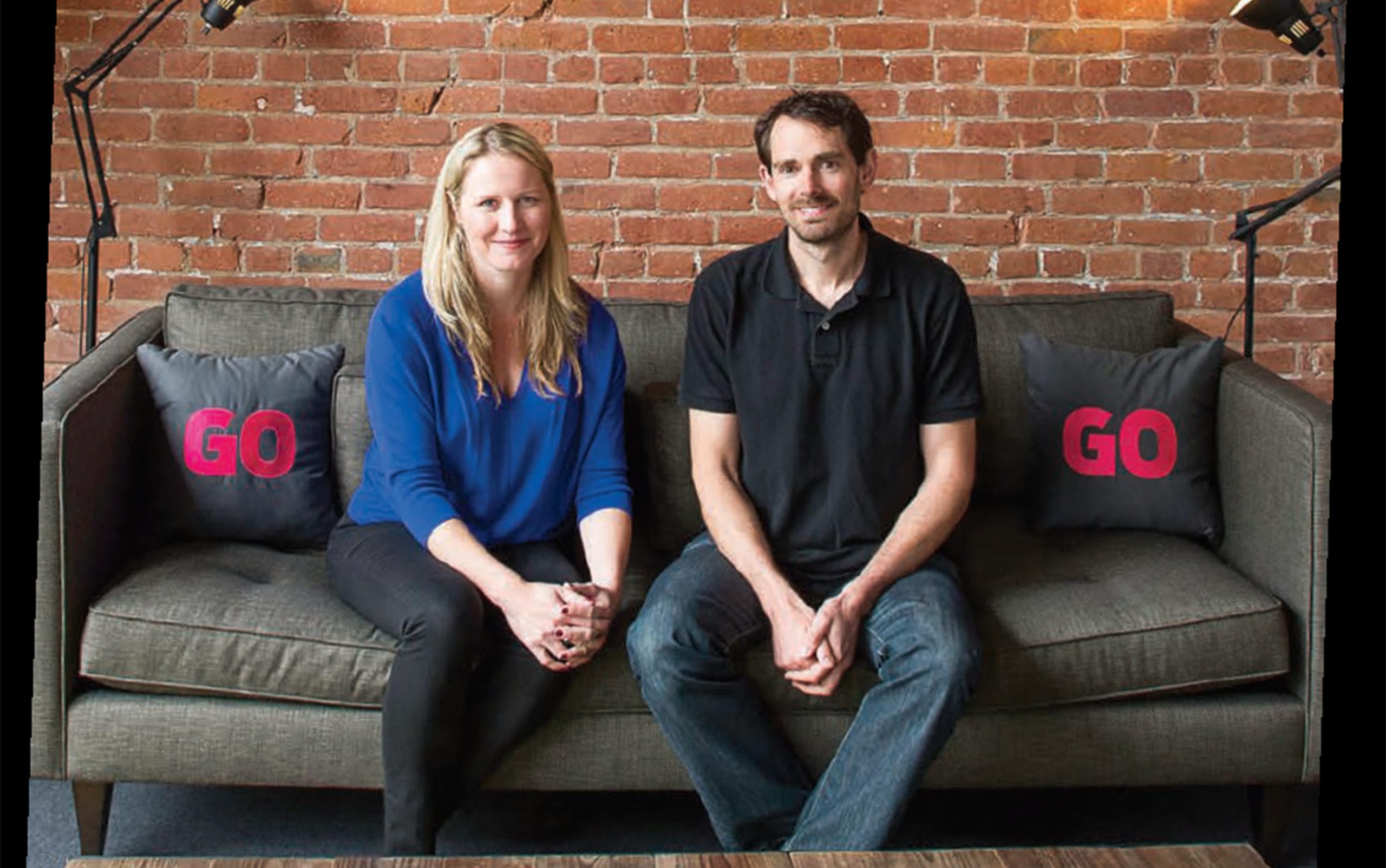
Danae Ringelmann and Eric Schell, MBA 08s, began working on Indiegogo, one of the world’s first crowdfunding platforms, while students at Haas and used their Haas connections to develop the company. Photo by Genevieve Shiffrar. - Nikhil Arora and Alejandro Velez, both BS 09, grew mushrooms from used coffee grounds in their Haas class, which led to their startup Back to the Roots—now a national brand with products sold in thousands of stores.
- Jason Bellet, BS 14, along with engineering alumni Connor Landgraf, BS 13, MEng 14 (bioengineering), and Tyler Crouch, BS 14 (mechanical engineering), founded Eko in 2013 and developed an FDA-cleared platform of AI-powered stethoscopes for early detection of cardiovascular disease.
Roots of social responsibility
The Haas tradition of educating leaders who prioritize the social impact of business dates back more than 100 years.
The school is named for Walter A. Haas, Sr., BS 1910, whose family at Levi Strauss & Company outfitted Western miners in a new kind of work pants that evolved into Levi’s iconic blue jeans. Haas Sr.’s views on social welfare and public affairs were influenced by the school’s first female instructor, Jessica Peixotto, and led him to grow this apparel manufacturer into one of the country’s largest socially responsible businesses. Later, as Levi’s CEO, he noted that the company “owes responsibility to the communities in which we do business.”
The company “owes responsibility to the communities in which we do business.” — Walter A. Haas, Sr., BS 1910
During the late 1950s, Earl F. Cheit, the future dean, ushered in the study of corporate social responsibility through research and teaching. Cheit organized the first national symposium on the subject in 1964, and Berkeley’s coursework became the model for other leading business schools with support from Professors Dow Votaw and Edwin Epstein.
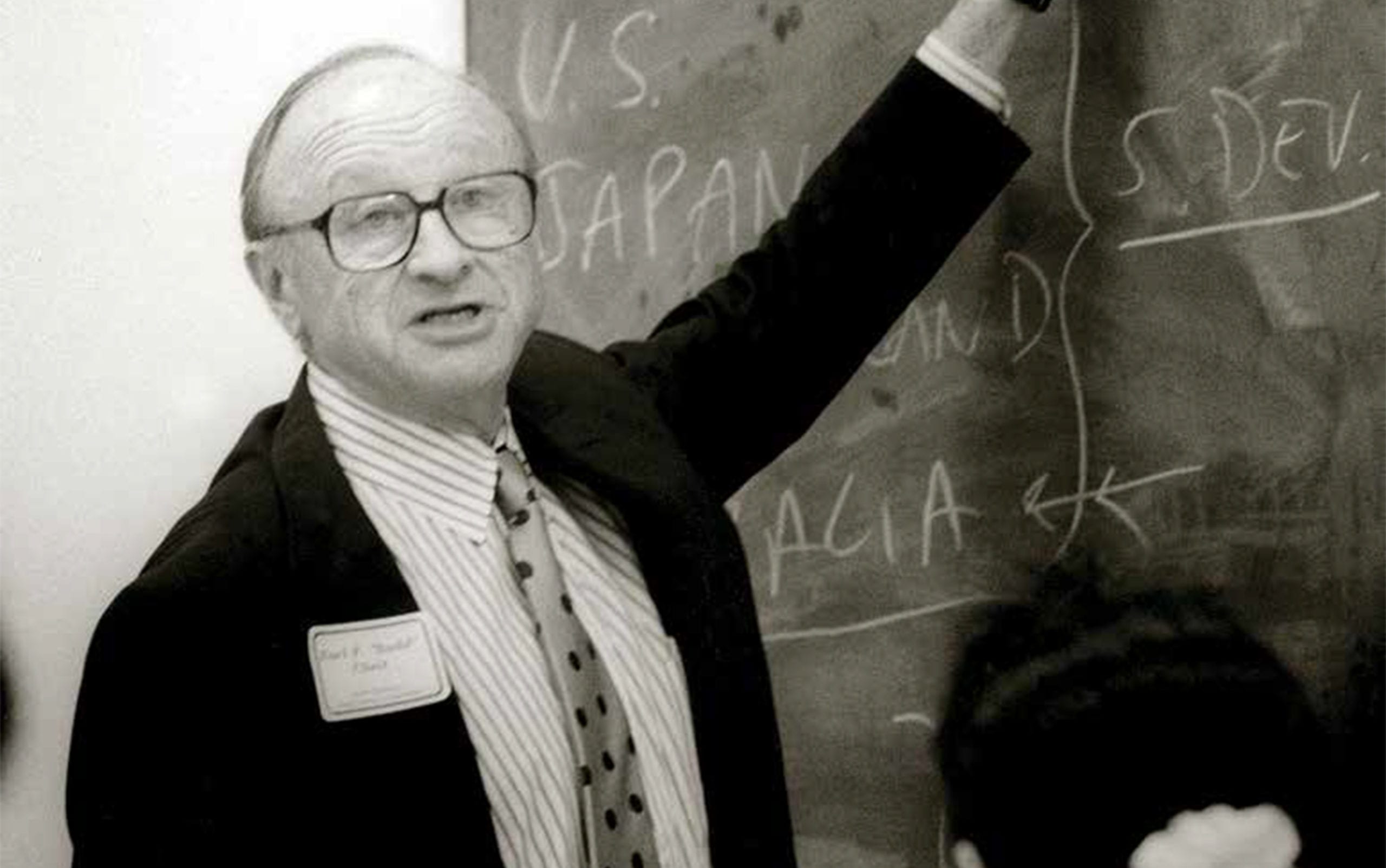
Decades later, The Center for Responsible Business in 2002, brought Haas into the modern corporate social responsibility and business sustainability movements. Six years later, The Financial Times named Haas number one in the world in this area.
Prioritizing inclusion
Socioeconomic mobility is core to both the UC Berkeley and Haas missions. Over the past six years, Haas has made substantive changes to increase diversity and representation, engender lifelong learning around equity and inclusion, and cultivate belonging.
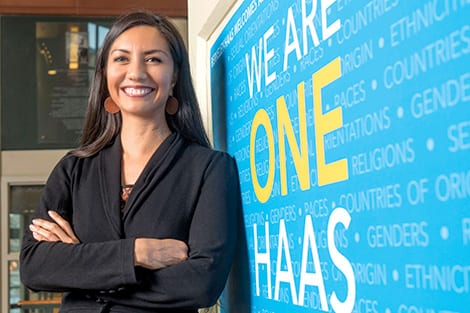
When Harrison joined as dean, she made Diversity Equity Justice and Belonging (DEIJB) a priority by meeting with student leaders; significantly increasing student support; modifying the core MBA curriculum to require a course on leading diverse teams; and diversifying the Haas faculty and Haas School Board.
Haas also appointed Chief DEI Officer Élida Bautista to oversee a six-person team focusing on admissions, community-related DEIJB issues, and, uniquely, faculty support.
Building on the Defining Leadership Principles, the school’s DEI Strategic Plan, first drafted in 2018 and updated in 2021, outlines aspirations for a learning environment where everyone belongs and everyone can thrive. The plan aims to equip all members of the Haas community to effectively lead diverse teams. (Research from Haas faculty and the work of the Center for Equity, Gender, and Leadership (EGAL) makes the business case that diversity on teams can drive performance.)
The Heart of What’s Next
Looking forward, Haas continues to build on its academic strength in undergraduate, graduate, and non-degree executive education offerings.
The school also continues to embrace new ideas. The COVID-19 pandemic accelerated the school’s foray to digital education, inspired by Berkeley Executive Education’s early adoption of virtual classroom teaching.
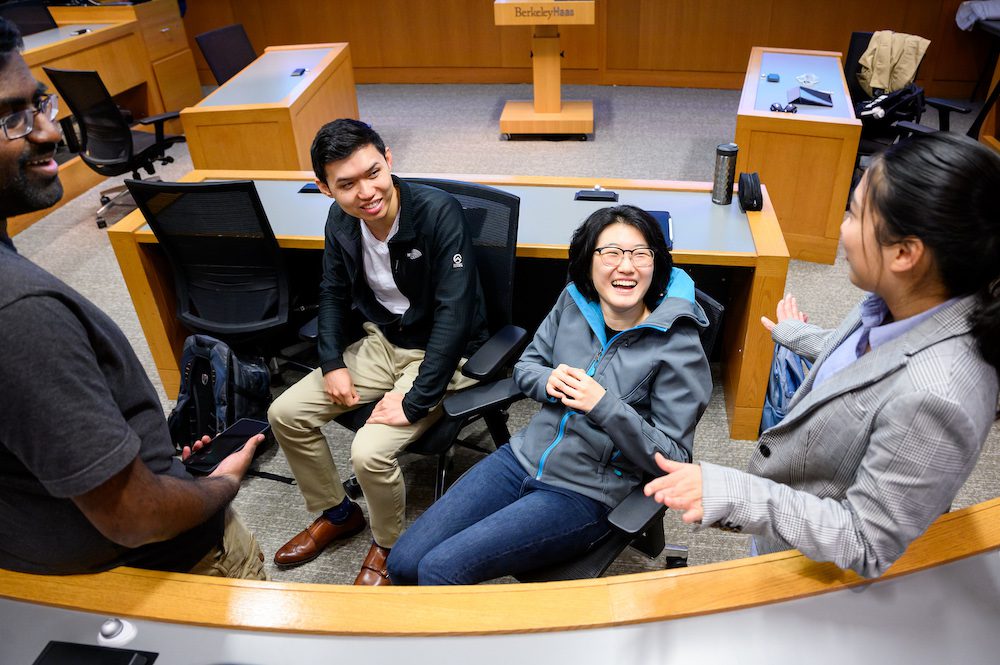
The virtual classrooms now anchor the Flex MBA program,—now in its second year—which combines academic courses in a live online environment with the option to come to campus for electives. At the undergraduate level, the school’s two-year program is expanding to become the four-year Spieker Undergraduate Program. The first four-year cohort will enroll in August of 2024.
Stepping up to address the severity of climate change, Haas created the Office of Sustainability and Climate Change to support teaching and research across agriculture, real estate, energy, finance, and corporate sectors. The school’s investment in sustainability includes the greenest academic building in the U.S., Chou Hall, having earned TRUE Zero Waste certification at the highest possible level along with a LEED Platinum certification for its energy efficient design and operation. Plans are now underway to launch a joint MBA/master’s in climate solutions degree with Berkeley’s Rausser College of Natural Resources.
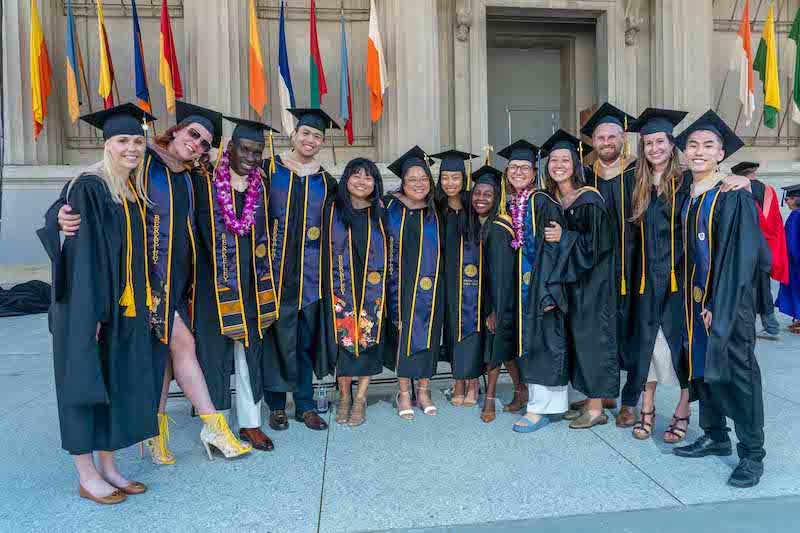
Many of the school’s advancements have been made possible through the support of its loyal alumni, who continue to make Haas stronger through their engagement as teachers, mentors, employers, partners, and donors to the school.
Harrison said she is looking forward to celebrating the school’s many milestones and to what the future will bring, noting, “We look back with pride, but we move forward to have impact.”
Watch for more details about the anniversary in the forthcoming summer issue of the Berkeley Haas Magazine or read more Haas history on the website.
The world’s most popular MBA programs
The MBA: An investment for your future
More impact, more difference: World-changing business degrees in 2023
‘Empathy and curiosity:’ How queen jaks is helping Haas make teaching more inclusive
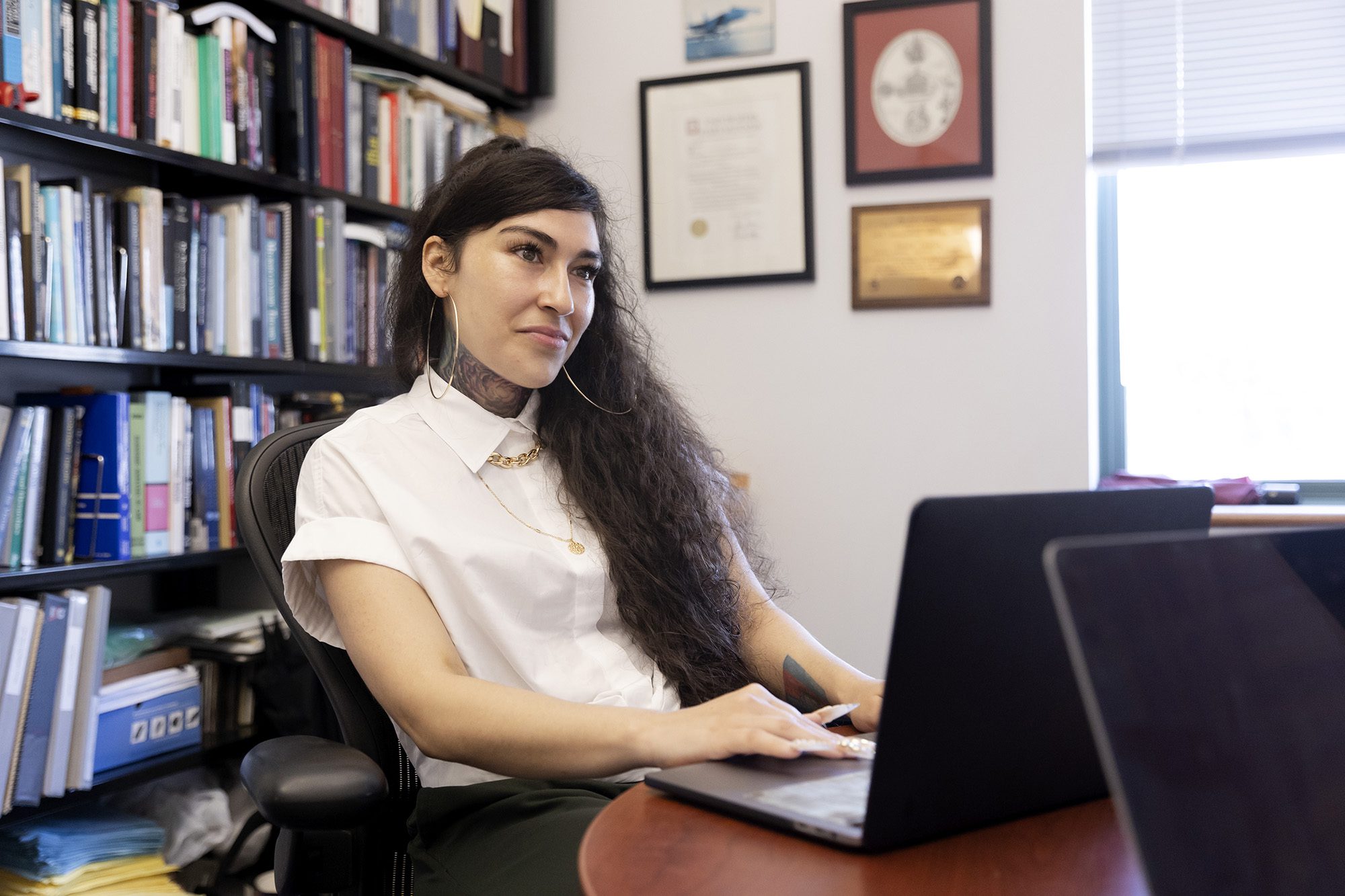
When Dr. queen jaks walks into a Berkeley Haas classroom and sits in the back scribbling notes, students wonder what’s going on.
“They think the professor is in trouble and I’m there to get the dirt,” says queen, who writes her name with lowercase letters.
But as the school’s first diversity instructional support consultant, queen is not an enforcer. She’s there as an invited guest of faculty members who want help in making their teaching more inclusive.
“It’s so important to make it clear that I’m not there to tell people they’re doing something wrong. I’m not there to hear both sides,” she says. “I’m there because the instructor wants support.”
Unique role
Over the past year, queen has been helping Haas faculty navigate the minefield of changing mores and heightened awareness around a range of topics often referred to as diversity, equity, inclusion, justice, and belonging (DEIJB). Her role is unique: Rather being called in to mediate when things heat up, she coaches instructors individually—by observing classes, offering suggestions on course content, or consulting on issues that come up in class. She also teaches best practices through brief workshops and exercises.
Holding both an MBA and a PhD in organizational behavior, queen is fluent in the language of academia, while also drawing on her own experiences of feeling like an outsider who broke into that world as a first-generation student from an impoverished community. She grew up in San Diego and earned a BS in business administration from UC Riverside, going on for her MBA from the University of Redlands and her doctorate from Case Western Reserve University.
She approaches the job with empathy, curiosity, and a natural sense of humor.
“We’re all learning, we’re all going to make mistakes, and that’s okay,” says queen, whose own research focuses on the contributions of marginalized communities. “Society is evolving, and people want change really badly, so everything that comes out of your mouth in the classroom is going to be scrutinized. I’m here to say ‘I feel you. Now let’s turn it around and see how that might be perceived.’”
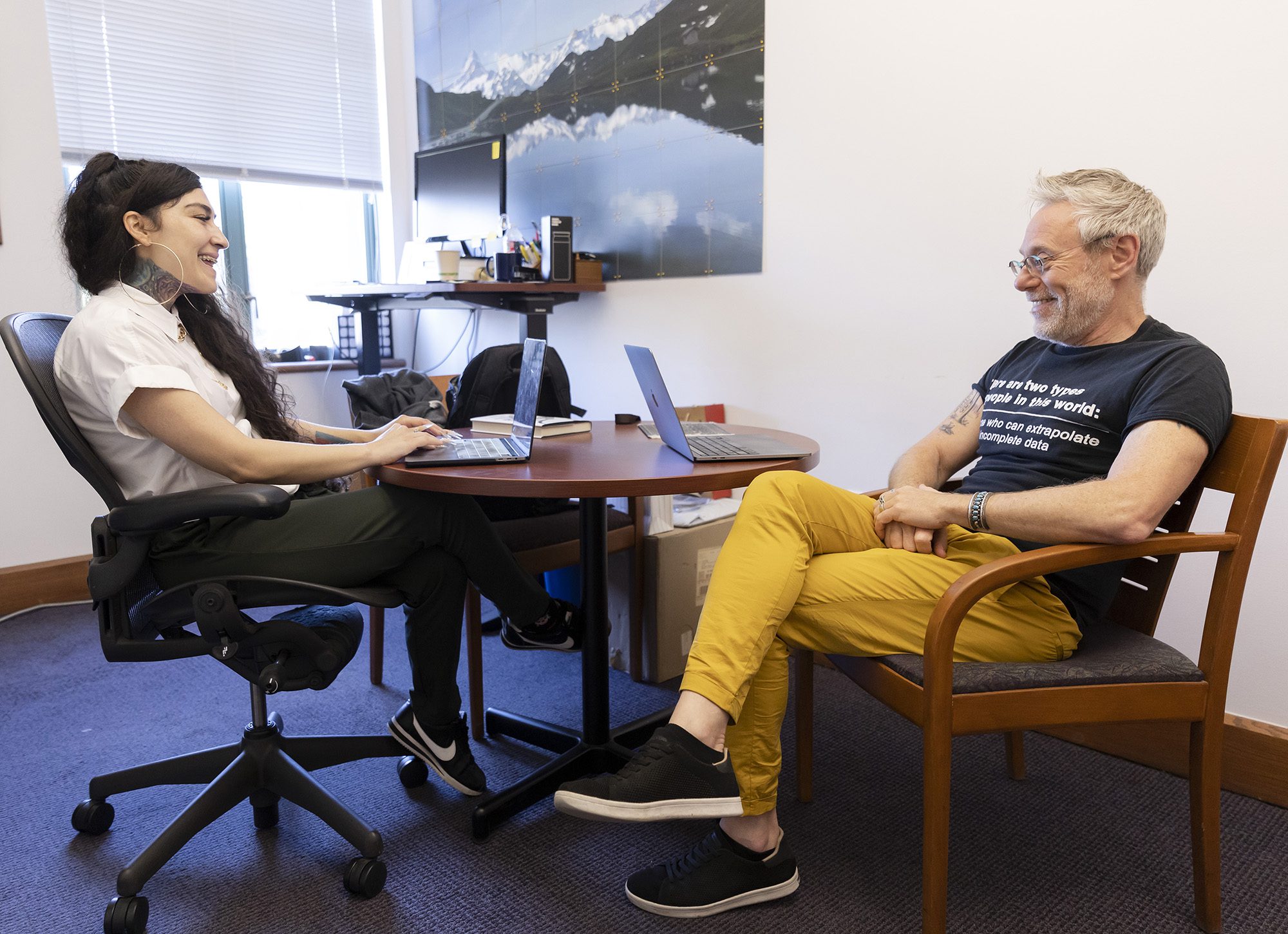
Haas Chief DEI Officer Élida Bautista dreamed up the new role in response to growing demand from students for more diversity in course content and on the faculty. In addition to the work Haas is doing to hire more diverse faculty members and an effort led by the Center for Equity, Gender and Leadership to compile a library of business cases featuring diverse protagonists, Bautista wanted to find a way to directly support current faculty. Dean Ann Harrison greenlighted the pilot position.
“When I looked around for consultants and talked to my counterparts at other business schools and universities, no one was doing this—so we didn’t really have a model,” Bautista says. As a clinical psychologist, she designed the role so that all services would be confidential and voluntary.
“Anytime you force people to do something, there’s an inherent resistance and that decreases the efficacy,” she said. “Some people think that when you make something voluntary, you end up preaching to the choir. But even the choir needs tuning: People who are bought into these ideas still need skills to carry them out, and they’ll end up bringing others along.”
Sensitive content
That’s what has happened. Associate Professor Juliana Schroeder—who championed the new role along with associate deans Jennifer Chatman and Don Moore and served on the hiring committee—offered to be a guinea pig for queen to observe her leadership class.
Schroeder is a social psychologist who has thought carefully about diversity and psychological safety in her teaching and materials. Still, on the day of the observation, when she was referencing the 1986 Challenger Space Shuttle explosion to shed light on decision-making pitfalls for a case study about car racing, a student had a “PTSD-like” incident in her classroom.
“He was an Army veteran, and this was directly relevant to his experience,” Schroeder says. “I was so glad queen was there that day, and I was blown away by how great her feedback was. It really illustrated what a benefit it was to have someone well-trained in these topics right there in my classroom.”
After the session, queen gave Schroeder a detailed report with suggestions on adjusting her script and offering both a written and verbal alert for sensitive topics. It also included a list of things she was doing well, and some practices to add—such as repeating back answers that were lower in volume, acknowledging students who were waiting to speak, and using contrasting colors on slides—as well as including photos in her slides that would show diversity beyond race and gender.
Word of mouth
Schroeder thought it was so helpful she asked to share it with other faculty members, and soon queen had a full calendar.
“Every single person I’ve worked with has been so receptive,” queen says. “I’ve spent a lot of time at business schools, and it’s been jaw-dropping how much Haas has embraced this.”
Associate Professor Mathijs De Vaan invited her to sit in on a session focused on DEIJB in his MBA course Leading People. De Vaan, who grew up in The Netherlands, is mindful that his class includes international students who may be new to American culture, as well as students with backgrounds that have been marginalized in the U.S.
“It’s a challenge. There’s always a group of students who are very knowledgeable and very vocal, and others who know these are sensitive subjects and are afraid to speak at all,” says De Vaan. “I wanted students to be on the same page in understanding the scope of the problem that racism and discrimination represent in the U.S., so I gave them a number of examples of where companies fell short.”
That’s important, queen told him, but it can also be stressful for some students. “For minority students in the room, it might reinforce the idea that their group is marginalized,” he says. To address this, in the next iteration of the class he focused less on examples of problematic situations, and more on possible solutions to societal challenges.
Phasing out the ‘cold call’
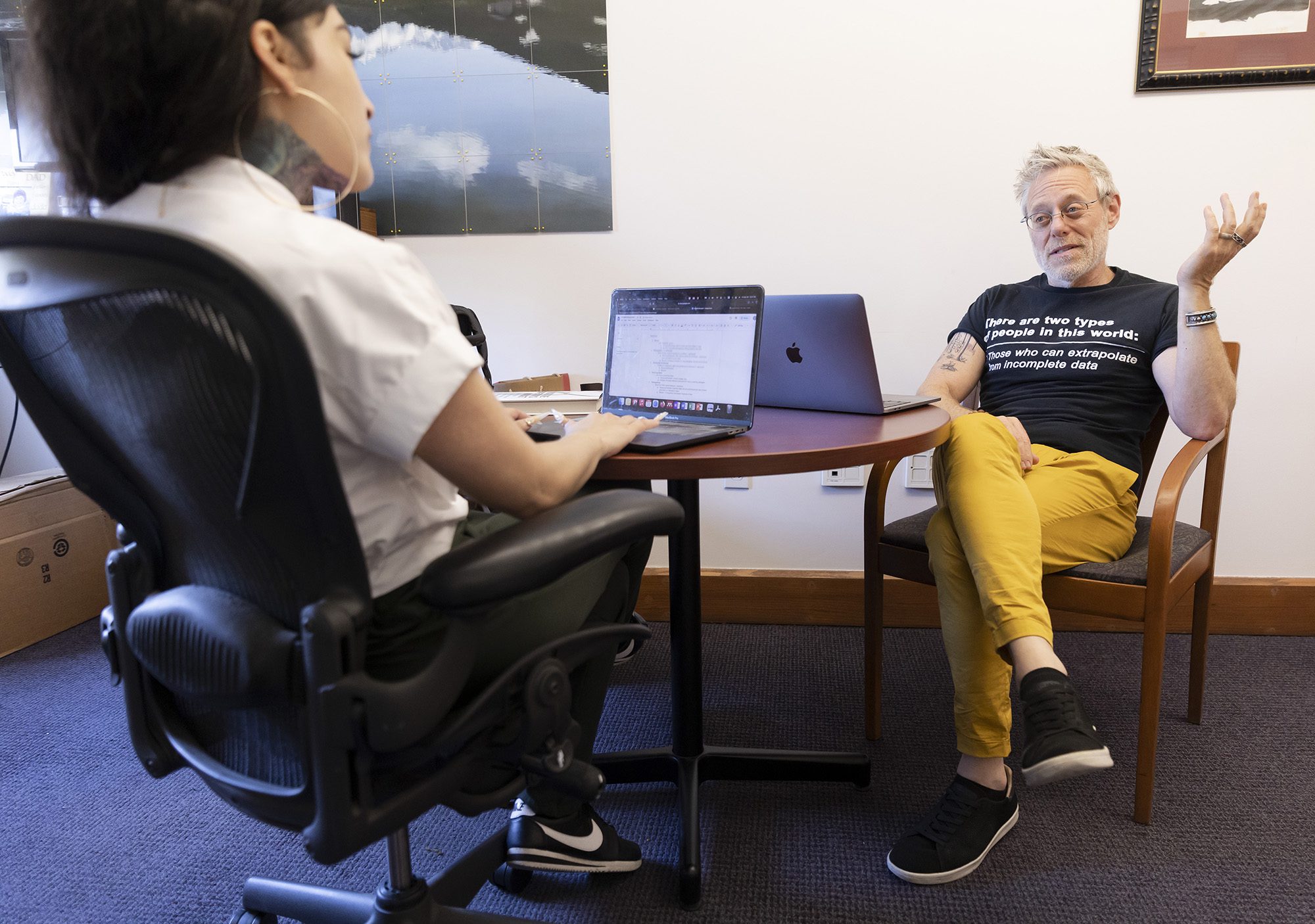
As an instructor in the Israeli Air Force almost 40 years ago, Professor Steve Tadelis says he learned how to teach through feedback from required classroom observations. But the DEI workshops he had taken hadn’t helped him with the specific challenges he faces as an instructor. “I was very open to this,” he says.
After working with queen, Tadelis stood up at the fall faculty meeting to give her an enthusiastic endorsement and encourage others to seek her out. He says he appreciated that she gave him straightforward ways to improve his teaching, including rethinking how he was calling on students.
“I do relatively little of the classic business school ‘cold calling,’ because of the artificial aspect of it. It’s rare in the workplace that a senior leader would suddenly turn to someone and say, ‘What do you think we should do about this?’ They would want more preparation,” Tadelis says.
But after consulting with queen, he realized he could give people even more choice in how they participate without lowering his requirements. “My goal is to give each student a set of tools that they can use as decisionmaker, but I’m not there to change their personalities,” he says.
Debate and experimentation
Tadelis, an economist, still worries about how to create a safe classroom space without shutting down honest debate, and how to let people have moments of discomfort in a respectful way.
“How do we create language that is precise, knowing that some words are clearly off limits but not everyone is going to love every word?”, he says. “There are so many historical wrongs that need to be acknowledged and addressed. But it would be nice if there was less combativeness and more debate, exploration, and experimentation.”
That’s one of the reasons queen’s approach has been so effective. She believes that instructors need to pay attention to students’ needs as individuals beyond their grades, and that many practices need updating. At the same time, she believes in collaboration—and good intentions.
“How we define and integrate DEI is constantly changing, which means that no one—myself included—has all the answers,” queen says. “We just all have to keep giving each other feedback and grace, looking at what we can do better next time.”
In person? Online? Which part-time MBA schedule is right for you?
‘Bring Haas to more people’: Business school concludes first year of flex program
Globetrotters, parents, and career boosters: Meet the inaugural Flex MBA class
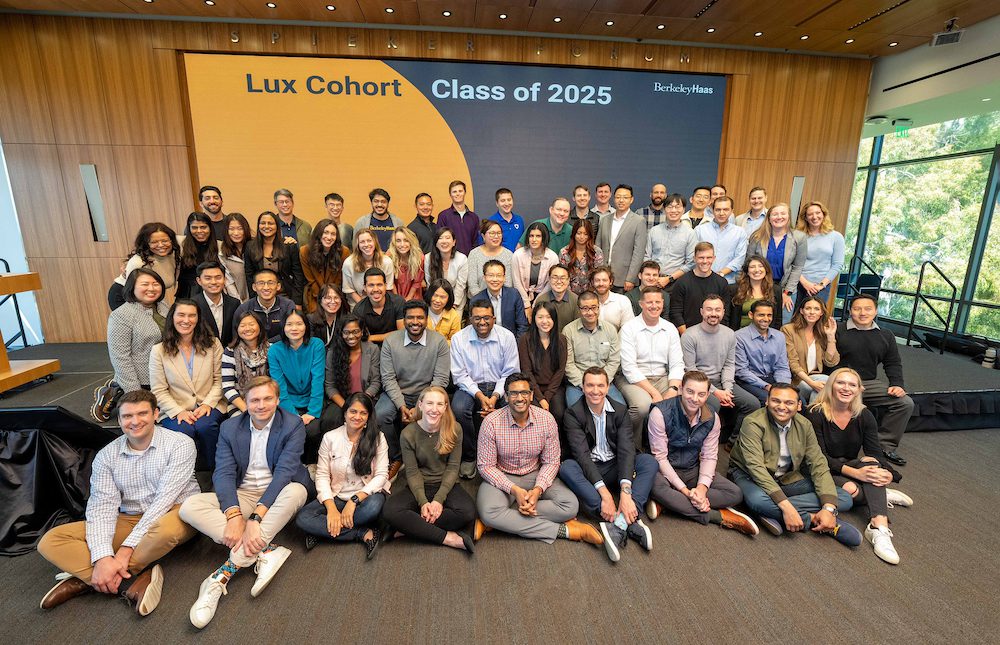
Thomas Seidl, a data science manager for Red Bull Soccer in Munich, set a goal to get an MBA from a top American university to future-proof his career in sports analytics. Trouble was, he wanted to stay in Germany with his wife and two young children.
“I wanted to see whether there was an option to do an MBA in the United States at a world class university from home basically,” said Seidl, who holds a PhD in computer science in sports. “I was curious about whether I could get into a top-ranked program. I just wanted to give it my best shot.”
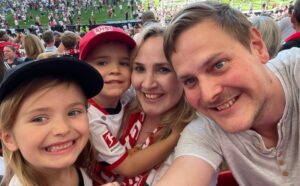
Seidl didn’t have any luck finding an online program in the U.S. that met his requirements. But then, while researching the Berkeley Haas Evening & Weekend Program, he discovered the new Flex MBA option, which lets students take courses remotely with the option to come to campus for electives. It sounded perfect, so Seidl applied and was accepted, joining 68 other students last year in the inaugural Flex cohort, who hail from the U.S., Canada, Egypt, Japan, the Netherlands, Singapore, and the United Arab Emirates.
The Flex cohort, launched last year, does things a bit differently. While the evening and weekend MBA cohorts meet in person during scheduled blocks of time throughout their programs—on either evenings or weekends—Flex students take their core courses remotely, with an option to come to campus for electives. For parents, caregivers, and professionals who move or travel often for their careers or for fun, Flex provides what they say they need most: schedule flexibility.
“The Flex program allowed me to stay in Los Angeles and stay very close to my family while also getting an MBA,” said Kevin Haroldo Ramirez, who was a philosophy and legal studies major as a UC Berkeley undergraduate. As a senior consultant at Edgility Consulting, Ramirez said he wanted an MBA to sharpen his business skills as his career progresses in the nonprofit sector.
“It worked out perfectly”
Like Ramirez, about 74% of the Flex class is from outside of the Bay Area, joining from nine California counties and 17 U.S. states. Seven students are living abroad, and many have relocated during the program, says Leah Rozeboom, director of Flex Experience.
Some students living in different time zones, like Seidl, log on in the middle of the night twice a week to take classes. “When class is over at 3 a.m., you start to think about the content and you try to get back to sleep,” he said. “But then your brain just starts to get into all of these ideas about ‘how can I apply this stuff in sports?’ Sometimes it’s difficult, but I think that’s a good sign that I am engaged.”
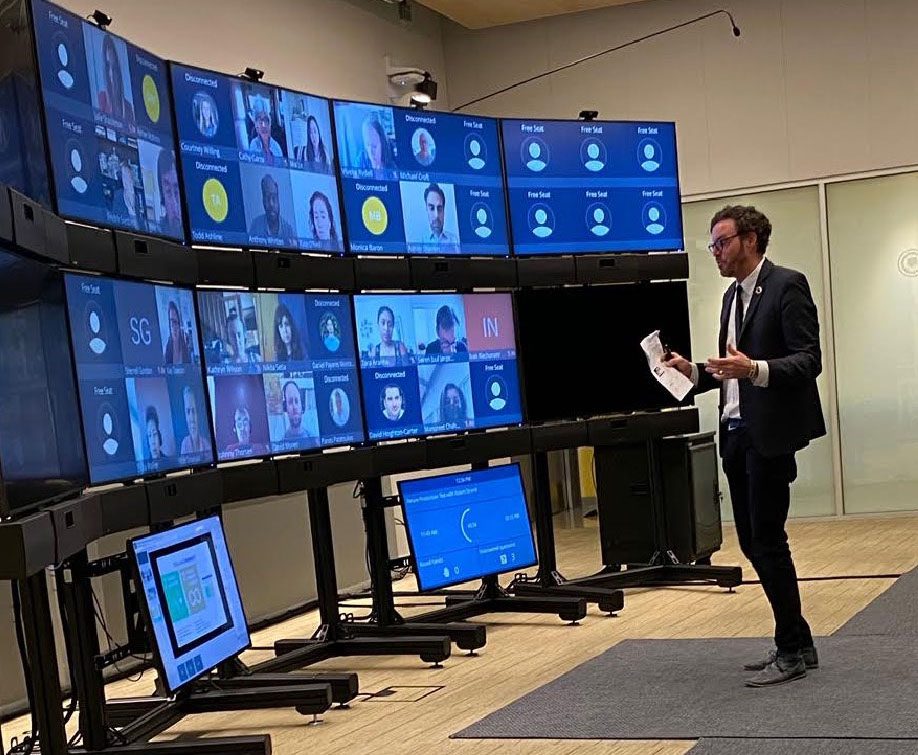
Kinshuk Verma, a product manager for Electric Hydrogen, who lives in San Jose, Ca., applied to Flex because of her heavy travel schedule. “At my previous job, I was traveling more than 50% of the time, and I knew that the weekend or weekday schedule was not going to work for me,” she said “Once I got into the Flex program, I had a baby, and it worked out perfectly.”
With an equally hectic life, Molly (Hill) Bjorkman, a mom of two who juggles work as a manager for an arts nonprofit and helps run Napa-based GRO wines with her husband, Lars Bjorkman, said she never considered commuting to do an MBA.
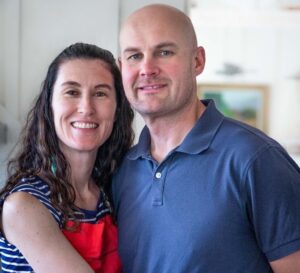
For Bjorkman, easing back into school during the first semester was difficult but fulfilling. “The core classes are challenging,” she said. “I am an all As” type so I have to be a little forgiving of myself and the first semester was, ‘how do I do school again? There’s so much that was new and there is still not enough time.” Last semester, Bjorkman, mom to an 11-year-old and 13-year-old, rose at 5 a.m. at her Calistoga, Ca., home to do an hour of asynchronous course work before heading to her local office. On Tuesdays and Thursdays from 4-6 p.m. she joined live classes.
Bjorkman said she was impressed by the camaraderie among the many mothers in Flex. Her study group includes moms Erin Mitsuyoshi, who lives in Hawaii, and Sophie Christian, who lives in Portland, Oregon.
Christian, a college piano professor, said the group’s connection on Slack and at in-person weekend have helped make bonds stronger.
Christian said the pandemic and its many restrictions led her to pursue a new career path for herself that she believes will lead to a bigger impact. “I wanted something more flexible in business so I’m exploring,” she said. “I still run my teaching business but I am letting go of that part of my life. I jumped at the chance when Berkeley offered this program.”
Coming together
Last April, the Flex cohort convened in Berkeley for an in-person weekend. Students participated in Leadership Communications course sessions on compelling storytelling and finding your authentic leadership style, completed one-on-one coaching sessions, and enjoyed small group dinners with Haas faculty and coffee with students in the evening MBA cohort.
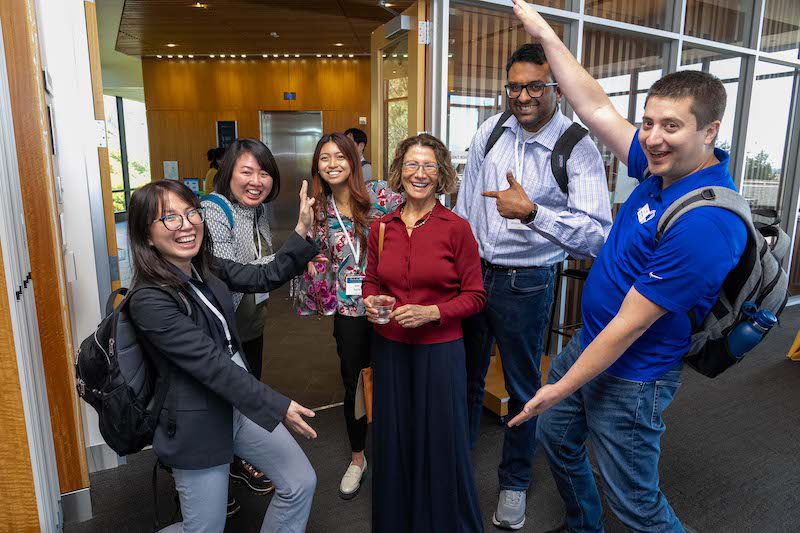
Maria Carkovic, who taught their Macroeconomics class, surprised the cohort in person during lunch at Chou Hall, where they met her for the first time. “It was a wonderful surprise,” said Carkovic, who was chosen by the evening MBA class for the 2023 Cheit Award for teaching excellence. “I think that they were very aware that it was special to be together, so they were interacting to the max and connections were being formed. Life gets very complicated at the age that they go to grad school in business and the Flex program works to their advantage.”
Strong bonds have formed within the group, encouraged in part by cohort representative Lisa Dalgliesh, who is described by many classmates as a connector.
During Flex orientation kickoff, she said she was pleased to meet three other students from Texas sitting at her table. The group now meets for occasional dinners in Texas. Last August, while traveling for work to Washington, D.C., she had dinner and drinks with four classmates, and she hosted classmates when they traveled to Austin for work.
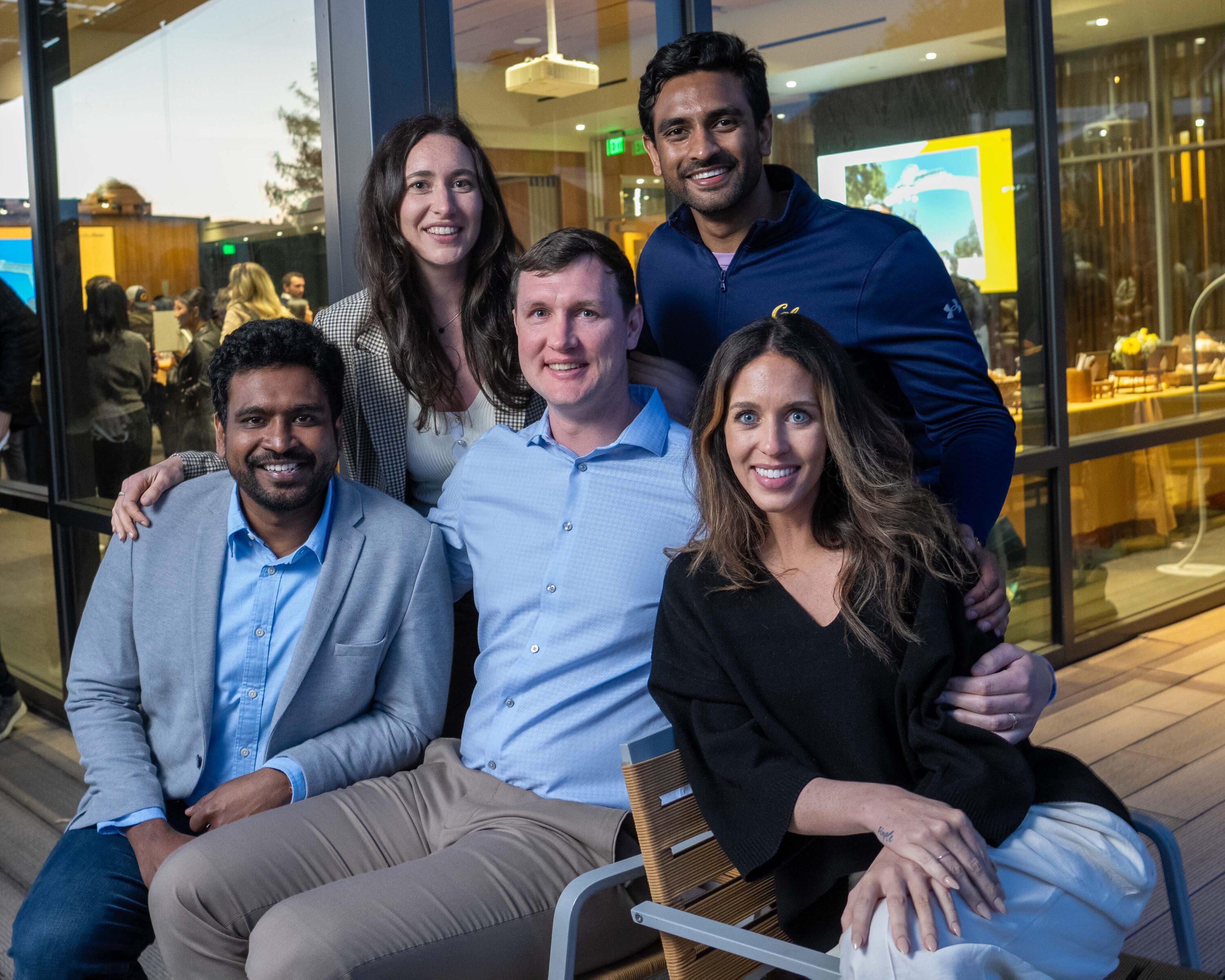
Dalgliesh, who lives in Austin and works as a people strategy and integration leader for Deloitte, said she chose Flex, in part, to stay put in her native Texas and not uproot her life. “I thought there would be a social trade off when you go to a program like this, but that’s not been the case,” she said.“Quite the opposite..It’s fun to visit people in their hubs.”
Flex is “the future of academia,” she added. “This is an equitable approach to ensuring that people from all walks of life and at all different stages of life have an opportunity to tap into an education from a top tier institution from anywhere.” she said.
“This is an equitable approach to ensuring that people from all walks of life and at all different stages of life have an opportunity to tap into an education from a top-tier institution from anywhere.” – Lisa Dalgliesh, EWMBA 25
Class from anywhere
The pandemic, though isolating for many students, proved that both remote work and remote teaching are possible, even preferable for some, which is one reason why Flex applications are rising.
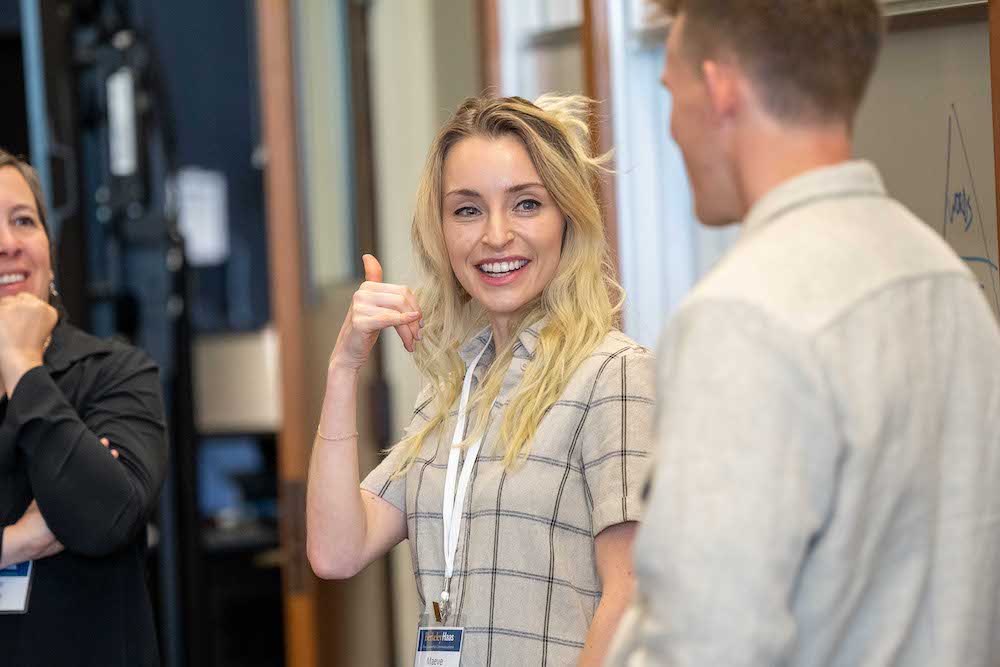
“We don’t take a one-size-fits all approach to our part-time programs for working professionals,” said Jamie Breen, assistant dean of Berkeley Haas MBA programs. “Flex is an inclusive, future-forward program that works for an increasing number of students who want to earn a world-class degree that fits with their schedules and lives.”
Cairo serves as a perfect base for Scott Diddams to travel all over Europe. “I’ve attended (Haas) MBA lectures from Paris, Athens, London, and Cairo,” said Diddams, a product manager at Microsoft, who logs into class from different time zones. “I feel like I’ve been able to keep up and perform just as well as if I were in person. If anything, as an introvert, it makes it even easier for me to pay attention when I’m in my own space and not worrying about the classroom.”
“I’ve attended (Haas) MBA lectures from Paris, Athens, London, and Cairo,” – Scott Diddams, a product manager at Microsoft.
After coming to campus in April, Diddams, a former paratrooper in the 82nd Airborne Division of the U.S. Army, stopped in Seattle to work at Microsoft headquarters before flying home. In a meeting with a senior engineer, Diddams said he tested some concepts he’d learned in his marketing class.
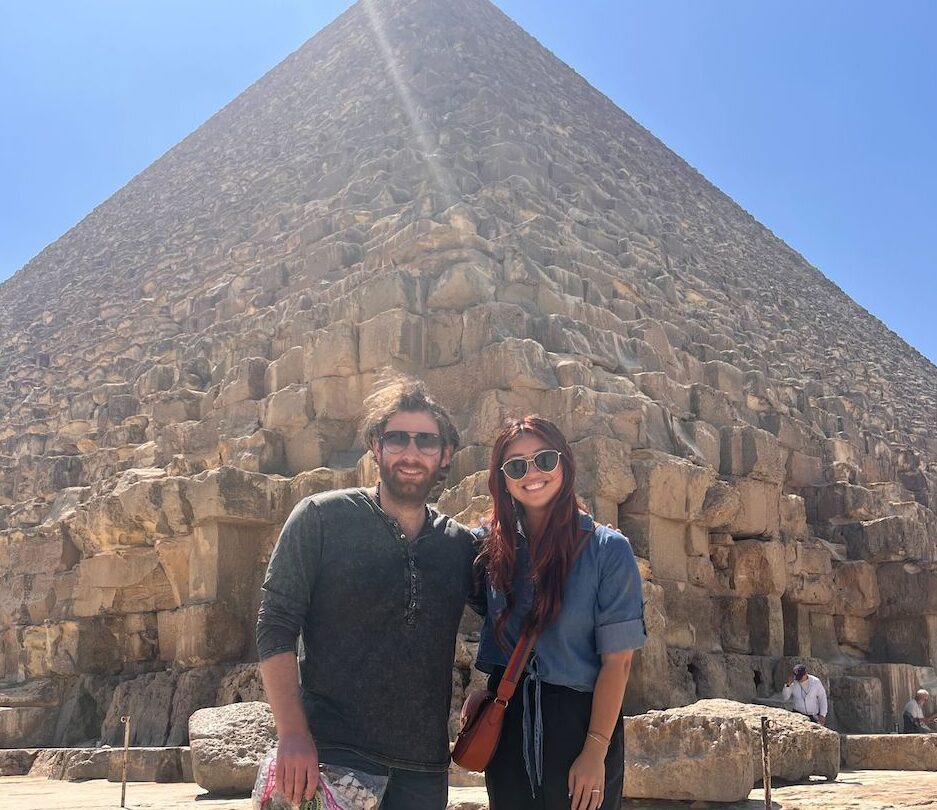
The manager gave him excellent feedback, he said. “Having that impact at work is something that I don’t think I would’ve been able to do a year ago before taking these courses,” he said. “I certainly felt much more confident.”
Macroeconomics was a favorite course, he said. “Attending that class from Egypt, which is undergoing a kind of financial inflation crisis, and being able to see that while learning about it,” he said, “that’s the perfect way to learn something.”
Like Diddams, Dalgliesh, who holds an undergraduate degree in psychology and a master’s degree in human dimensions of organizations from the University of Texas, Austin, said she believes her MBA will take her to the next step professionally.
“It was important for me to learn more about the business world so I can have a seat at the table,” she said.